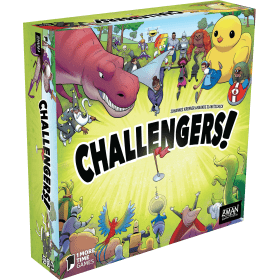Challengers!
 Challengers! is a deck-management game for 1-8 players that plays quickly regardless of player count.
Challengers! is a deck-management game for 1-8 players that plays quickly regardless of player count.
Modify your deck, then capture the flag. With a tournament gameplay style, you meet a new opponent every round.
Challengers! is the first of its kind, a board game implementation of the digital autobattler genre.
75 distinct characters with more than 40 exciting effects create a unique experience every game.
Number of players: 1 - 8
Game duration: 19 mn
Complexity: 2 / 5
Play Challengers! and 988 other games online.
No download necessary - play directly from your web browser.
With your friends and thousands of players from the whole world.
Free.

Play Challengers! and 988 other games online.
No download necessary - play directly from your web browser.
With your friends and thousands of players from the whole world.
Free.

Rules summary
Summary
Players participate in drafting ("Deck Phase") and card reveal ("Match Phase") phases for 7 rounds.
After this, for 3-8 player games, only 2 players qualify for a final match by having the most fans after all 7 rounds.
For 1-2 players, there is no final, and the player with the most fans wins. For 1-2 players, if a player has an advantage of at least 11 fans after a Match Phase, they win immediately.
Cards
Each card has a base power shown in the top corners, as well as a card set icon on the top sides. Cards also have letter(s) in the bottom right corner describing their level:
* S = Starter card
* A = Low level card, up to 3 base power
* B = Medium level card, up to 5 base power
* C = High level card, up to 10 base power
* R = Robot higher difficulty card
* SOLO = Robot solo challenge card
Sets
The city card set, including starter cards, is always in the game. There are 6 additional sets, but only 5 of them are used for each game, resulting in different possible deck combinations. If the Robot opponent is used, it has its own set.
Aside from starter and Robot cards, each set contains 4 copies of every card unless the card specifies "Rare" or "Common". In this case, the number of copies is shown on the card itself.
Deck Phase
Players add 1 or 2 cards to their deck from a random secret display of 5 cards. Players can discard this display and redraw once per Deck Phase. (In rounds where you select 2 cards, you may pick your 1st card, discard the 4 cards not chosen, then redraw 4 cards from the same pile from which you pick your 2nd card.) Finally, players can remove one or more cards to trim their deck.
In later rounds, players have the option to choose a display of more powerful B or C cards.
Match Phase
Each player automatically shuffles their deck and is paired against a single opponent. Each pair of players compete to capture and hold a flag by revealing cards from their decks. Multiple 2-player matches play out simultaneously, as if each was its own minigame.
Gameplay
Each match consists of players fighting over a flag, which moves back and forth as it is captured. A match starts with the player who has the highest trophy number in flag possession. If there is a tie, a random player starts in flag possession. This player reveals the top card of their deck and places the flag on it. If the card describes an effect which should occur, it happens at this time.
Next, their opponent must attack to capture the flag. They attack by revealing cards from the top of their shuffled deck, one at a time. The base power of each revealed attacking card is added together and compared to the defending card's base power. In addition, some card effects may modify power on the attacking or defending side.
Once the attacker's power is equal to or greater than the defender's power, the defender moves their card to an open slot on their bench -- an area with 6 slots for cards. Each bench slot can hold any number of cards with the same card name, but a single slot cannot hold two cards with different names.
Finally, the attacker slides all of their revealed card(s) together to form a stack with only 1 visible card on top. The flag is moved to this card, which is now in flag possession and defends. Its defense power only considers itself and any "From the bench" card effects, NOT any hidden cards underneath it.
Now, the cycle repeats. The other player attacks by revealing card(s) until their combined power is equal to or greater than the defending power. The defender moves card(s) to the bench, becomes the attacker, and so on.
End of Match
A match ends if a player needs to draw a card from their deck, and cannot.
A match also ends if a player needs to move card(s) to their bench, and does not have enough slots -- either empty or with the same name as the incoming card(s).
In either case, that player loses. Their opponent gains the trophy for the current round. Each trophy has a secret number of fans on the other side, represented by stars. The number of fans possible from trophies is as follows:
Round 1: 2, 2, 2, 3
Round 2: 2, 2, 3, 3
Round 3: 3, 3, 4, 4
Round 4: 5, 5, 6, 6
Round 5: 6, 6, 6, 7
Round 6: 7, 7, 7, 8
Round 7: 9, 9, 10, 10
Fans from trophies are kept secret until the final round in 3-8 player games, and are public in 1-2 player games.
New Round
Each round may offer more powerful cards to choose from. Each round also matches players against new opponents in 3-8 player games.
Card Effects
If a card does not have a bolded keyword, its effect happens when it is revealed. Effects are resolved as much as possible. If a card gets an immediate power bonus, it maintains it even in flag possession.
If an effect gives fans, the player takes a number of public fan tokens.
If an effect puts card(s) on the exhaust pile, the cards are moved to a faceup pile. This pile has no limit and cards in it have no effect. Moving cards to the exhaust pile can help clear your bench so you do not lose.
If an effect has a bolded keyword, it takes effect in different ways:
* During the attack: Their effect only applies to the attack in which you reveal them. The effect is no longer active when one of your cards is in flag possession.
* From the bench: Their effect applies as soon as this card is on the bench and is active as long as it remains on the bench. The power bonuses of multiple cards with the same name add up.
* In flag possession: Their effect applies as soon as the flag is placed on this card and is active as long as the flag remains on it.
* Flag loss: Their effect is resolved when the flag is taken away from this card. Therefore this card must have been in flag possession beforehand. Flag loss effects are resolved prior to effects that apply when a card gets in flag possession.
* When picked (only in Outer Space Set): Their effect is resolved once only in the Deck Phase in which you pick this card.
Final Round
For 3-8 player games, each player reveals any fans from trophies they collected. This value is added to any public fan tokens the player has. The 2 players with the most fans qualify for a final match, and all other players are only spectators. If there is a tie for most fans, ties are broken by the player who won the most trophies, and then by the player who has the trophy with the highest round number. Before the final match, there are no new cards, but each finalist is allowed to remove card(s) from their deck.
For 1-2 player games, there is no final round, and the game ends after 7 rounds, or earlier as described below.
End of Game
For 3-8 player games, the game ends after the final round. The winner of the final round wins the entire game, regardless of total fans.
For 1-2 players, if a player has an advantage of at least 11 fans after a Match Phase, they win immediately. Otherwise, the player with the most total fans after 7 rounds wins.
Winter Park Setup
The Winter Park mini-expansion can be used with two setup options:
* Normal Winter Park: The Winter Park replaces one park at a time, starting with the green park. At the start of each deck phase, there is a 50% chance the Winter Park moves to the next park, following the order green -> red -> purple -> yellow -> green. The final is always held in the Winter Park.
* Winter Park For All: The Winter Park replaces all parks for the whole game.
The full Winter Park rules can be found here: https://boardgamegeek.com/filepage/250545/winter-park-goodie-rulebook
Winter Park Summary
For the Winter Park, there are 2 frozen seats on each side. When you put cards on your bench, you may choose to put cards on the frozen seats. The frozen seats can have any mix of cards, even of different types, as long as the total BASE power is less than or equal to the current round. For the final, 7 total base power is still the limit.
For example, in round 3 you could have 3 Newcomers on a frozen seat, or you could have Clown and Talent sharing the seat.
However, all card effects and icons are ignored in the frozen seat, and frozen seat cards cannot be targeted or used by other cards.
* Example 1: A Vendor on a frozen seat would not boost Funfair cards.
* Example 2: A Butler would not remove cards from a frozen seat.
* Example 3: A Stable Boy would not count a Cat on a frozen seat.
If the Robot Opponent is on the Winter Park, it ignores the frozen seat rules on its side.
Tip: You can click a blue frozen card to expand that seat and show a reminder tooltip.
Robot Opponent
For games with an odd number of players, a Robot opponent is included. The Robot has its own deck of starter cards and does not participate in Deck Phases. The Robot can be set as difficulty level 1 through 5. Levels 4 and 5 are strong and not suggested to a multiplayer game, since they can feel unfair.
Higher Robot difficulty levels replace the Robot's starter cards with a random selection of stronger cards.
In 3-7 player games, the Robot does not keep any trophies it wins. It thus earns no fans and can never be a finalist. In 1 player games, the Robot keeps trophies and earns fans from them.
Solo Mode
A human player can play against the Robot opponent. The rules for a 2-player game are followed, including the possibility to win early with an advantage of at least 11 fans after a Match Phase.
In addition, setup for Solo Mode includes the "Solo special challenge" option. If this is enabled, there is a chance that one or more "SOLO" cards are included in the Robot's deck, adding even greater difficulty.



